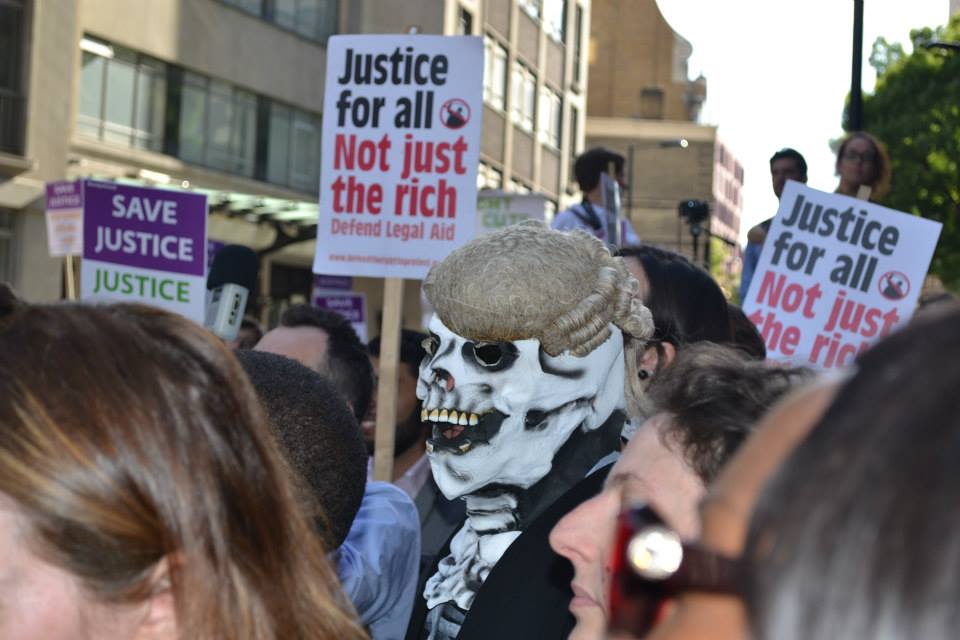In England and Wales, aspiring criminal lawyers (like any other lawyer) receive four to five years of university education, followed by a further one to two years on-the-job training before they qualify. In contrast, somebody stopped by the police, arrested or even appearing before a criminal court, will have little understanding of the laws that will soon determine what happens to them.
Whilst the right to defend one’s own case exists, many would expect the option of a specialist to do so on their behalf, to match the trained prosecutor they would be up against. However, what happens if you cannot afford to hire a criminal lawyer? Many countries have a system of publicly funded criminal defence lawyers to advise, assist and represent the poor. In England and Wales (unlike, say, the USA), this service is almost exclusively provided by the private sector. Provided that your case is considered of sufficient merit and your income falls below a particular threshold (both assessed by government), the government pays your lawyers’ fees (often via ‘fixed’ amounts for particular kinds of work) and also sets the rate of those fees. This is called ‘legal aid’.
However, there are concerns with the operation of this scheme. Defence lawyers report these fees have been cut and undermined by inflation over many years. The Law Society of England and Wales says there is a ‘looming crisis’ in the high average age of duty solicitors (those ‘on-call’ to assist detainees and defendants at police stations and courts) – the fees are so low that new recruits decide to practice in other areas of law. Likewise, the Bar Council’s latest survey of members suggests that well over half of criminal barristers feel unfairly paid.
One of the things I am interested in is whether (and, if so, how) this environment of austerity affects the work criminal defence lawyers do. When fees are reduced, what happens? Does it affect work on poor defendants’ cases? Could it lead to inefficiencies, or even miscarriages of justice? I decided to find out by asking those at the coalface, in a number of lengthy and anonymous interviews with criminal barristers and solicitors at various career stages and in various parts of England and Wales. I was humbled by the dedication and passion of those I spoke to. I also made some concerning findings.
Lawyers I spoke to identified three key areas where dwindling fees, in the context of the payment system (largely by fixed fees for particular work), might affect defence work:
- Plea advice
- Cases undertaken
- Thorough work
Plea advice
In some instances the lawyer involved felt they would earn more for one plea (guilty or not guilty) than the other. Particular circumstances were always important (e.g. issues in the case, particular offence/s, the client), but, for example, some serious and complex cases due to be dealt with in the Crown Court would attract much greater fees if the plea was ‘not guilty’ and there was a trial than if the defendant in the same case were to plead ‘guilty’. In other circumstances (for example, some cases in the magistrates courts) the opposite was true: a quick guilty plea would be the best financial outcome for the lawyers involved.
A cynic would say there are financial incentives to advise particular pleas and, indeed, none of the lawyers I spoke to anticipated significant difficulties in influencing clients in this way, albeit that they themselves never did it. The dilemma is complicated further by the reality that it is not always clear what the ‘best’ advice is. Take a client the lawyer believes is almost certain to be convicted on the evidence. It might be said it is in this client’s best interests to receive some robust advice, to wake them up to the reality that they are more than likely going to be convicted. With an early guilty plea they are entitled to a third off any sentence. There may also be the opportunity for a reduced charge, and/or a prosecution agreement to plead guilty based upon less serious facts than originally envisaged. Opportunities that may be lost in the event of pleading not guilty.
Here, robust advice could potentially save the client from a custodial sentence. Others would outline options in a more neutral manner, even if this results in a worse outcome for the client. Strong arguments could be made in favour of either approach. However, if both are legitimate strategies, but one approach is financially advantageous to the lawyer involved (all other things being equal), lawyers told me they are placed in a difficult position.
Cases undertaken
Interviewees also considered that many cases were financially self-defeating to take on, whereas others were so remunerative that even one or two of them could be the difference between having a profit and not. Cases could fall into either category for the most arbitrary of reasons.
For example, the self-employed were considered frequently at risk of failing the means test for legal aid. Not because they made too much money, but because they would struggle to find sufficient evidence to prove it, particularly if in custody. Likewise, the merits test for legal aid was considered at risk of being failed if the particular client was not at risk of a severe enough sentence.
Conversely, a client receiving benefits and with a terrible criminal record (or even serving a suspended prison sentence – i.e. immediate custody for any further crimes committed unless good reasons exist not to) would be almost certain to be granted legal aid and therefore financially advantageous to have. Other examples included some long and complex Crown Court trials. Of course, not every case can be avoided, but other coping mechanisms were mentioned too: e.g. performing less work on them, or passing them on to someone early in their career, who would therefore take the case for the experience/their CV.
Thorough working
The nature of any fixed payments scheme is that the incentive is to spend as little time as possible for each fee. It is better to spend time on three cases (3x fixed fees) vs spending the same portion of time on one case (1x fixed fee).
One example that was given was unused evidence disclosed by the prosecution. This does not affect the calculation of how high the fixed fee is – and therefore the fee is the same whether there are two pages of disclosed evidence to read vs 100 pages. One interviewee gave the example of the barrister and solicitor watching over 100 hours-worth of CCTV footage. All of this could be useless to your case, but you cannot know until you look at it. Other examples included appeals advice, staff training (for solicitors’ firms), assessing experts’ evidence and interviewing independent witnesses. In each case, as one lawyer put it ‘you either do the job properly and lose money or you don’t do the job properly’.
Hard margins
None of these, in themselves, need necessarily affect the work that defence lawyers do. Nor are the dilemmas raised unique to criminal lawyers. As a lecturer, I too get paid the same whether I spend hours preparing for a lecture or do nothing at all and ‘wing it’ on the day (provided the lecture seems ‘good enough’ to stop anyone complaining!)
However, the difference is that there is little incentive for me to do less (apart from laziness). Contrast that with a lawyer who can, instead, spend that time doing work for other clients that is more remunerative or who gets obvious financial punishment from a plea decision. Current fees also make the stakes uniquely high here: time and again, I was told that, in the current financial environment, these sorts of issues about how much time is spent on which cases and which categories of work or types of pleas, often mean the difference between having a profit and not.
To what extent this leads to defence lawyers selfishly following their financial self-interests at the expense of clients is unclear. The kind of research I did doesn’t establish how widespread or not it is (given the numbers of people spoken to relative to the total number of practitioners in England and Wales). What is interesting though is how lawyers experience the current setup as rewarding practices which many of them view as ‘poor work’ and punishing diligence (with insolvency, in some cases).
Whilst one could be highly critical of defence lawyers on this basis, my argument is that it is all very well for me or others to say that lawyers ought to subscribe to a particular set of values (fighting injustice, standing up for the client etc.) that I deem laudable – incentives be damned.
However, if having and acting on those values to their full potential sets one up commercially to fail, then that is a pointless goal. The problem is as much that the current financial conditions do not sustain, let alone encourage, those sorts of client-focused values as it is that some lawyers might not hold them.
Dr James Thornton is Lecturer in Law at Nottingham Trent University. The research mentioned in this article is due to be published (and discussed in greater depth) in Journal of Law and Society, Issue 4 of Volume 46 (2019).







